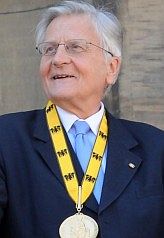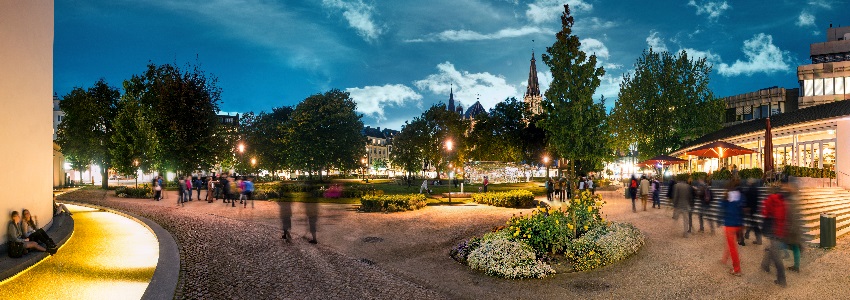Citation of the Board of Directors of the Society for the Conferring of the International Charlemagne Prize of Aachen
in honour of the President of the European Central Bank,
Dr Jean-Claude Trichet
 The euro is in danger.
The euro is in danger.
“If the euro fails, then Europe fails” (German Chancellor, Dr. Angela Merkel). The awarding of the 2011 International Charlemagne Prize of Aachen is a signal that the existence of the European Monetary Union and a stable euro must be secured. The euro has proven itself to be a success; without Monetary Union and the European Central Bank (ECB) the effects of the financial crisis would have been considerably more dramatic. A return to national currencies is not a viable path.
The European Central Bank has kept the promise of stability made by the founding fathers of the euro. Since the introduction of the euro, the ECB, and above all its President, Jean-Claude Trichet, has proved to the well over 300 million citizens of the euro area that they can rely on their currency. The Board of Directors of the Society for the conferring of the International Charlemagne Prize of Aachen has confidence in the actions of the ECB and its strong president, even in times of crisis.
The euro is of considerable importance, beyond the euro area, for the global economy and other currencies.
In 2002 the Board of Directors of the Charlemagne Prize Society awarded the Prize to the significant collective achievement that is the euro. Today, we honour the person who has for many years worked tirelessly for its stability.
In acknowledgement of his outstanding contribution to the cohesion of the Monetary Union and the maintenance of the competitiveness of the European Single Market as a cornerstone of our welfare and social security, the Board of Directors of the Society for the Conferring of the International Charlemagne Prize of Aachen honours, in 2011, the President of the European Central Bank, Dr Jean-Claude Trichet.
Jean-Claude Trichet stands for the independence of the European Central Bank.
“The central bank will always live up to its responsibilities. Because whoever puts price stability at risk, puts Europe at risk”. In just two sentences Trichet expresses vividly what both bothers and drives him. For him, who has helped shape the single currency from its very infancy, the euro is no mere means of payment but a precious thing, a currency of peace for a Europe that 65 years ago lay in ruins.
Jean-Claude Trichet was born on 20 December 1942 in Lyons. After school in Paris he attended the Ecole nationale supérieure des Mines de Nancy, from which he graduated in 1964 as “Ingénieur civil des Mines”. In 1966 he graduated from the Institut d’études politiques de Paris and was also awarded a bachelor’s degree in economics; he subsequently gained first experience in the competitive sector as an engineer. From 1969 to 1971 he attended the elite Ecole nationale d’administration (ENA).
In 1971 he joined the Ministry of Economics and Finance, in the audit department. In 1974 he was assigned to the General Inspectorate of Finance, and then moved a year later to the Treasury Department – the coordinating point of French monetary policy. In 1978 he was appointed as an adviser on industry, energy and research in the general secretariat of the then President of France Valéry Giscard d’Estaing. After François Mitterrand took over the presidency he returned, in 1981, to the Treasury, whose leadership he took over in 1987. He subsequently represented France at, among others, the World Bank and the International Monetary Fund, and in the negotiations for Economic and Monetary Union. In retrospect he, whom many call a “father of the euro”, says “I had the feeling that I was working on something that was of great historical importance”. (Die Welt am Sonntag, 20 June 2010)
In October 1993 he became Governor of the Banque de France, which had only a few months earlier been given its independence by the government. In this position, he played, together with the then president of the Deutschen Bundesbank, Hans Tietmeyer, a decisive role in preparing the introduction of the euro as part of European Economic and Monetary Union. His formal confirmation in the Governor’s office in 1999 was then a mere formality. The Heads of State or Government of the EU Member States had a year earlier already agreed informally that Trichet would, at a not yet specified time, become the successor to the ECB’s first President, Wim Duisenberg. After the latter announced his resignation, Trichet was officially nominated, in June 2003. On 1 November of the same year he began his eight-year term of office as President of the European Central Bank.
Already dubbed the “Ayatollah of the strong franc“ while at the head of the Banque de France, or called a “clone” of the Bundesbank, Trichet proved to be a guarantor of the independence of the European Central Bank; in 2004, for example, when he resisted pressure from the German and French governments to cut interest rates, and in December 2005, when he – against the wishes of ten governments – raised key rates in the euro area. The ECB recognised the coming of the global crisis at the beginning of August 2007 – just before the US property bubble burst – earlier than all other central banks. It then provided the money markets with an extraordinary volume of additional liquidity in order to safeguard financial stability. Cutting key rates to a historically low level, it countered the downturn and made a decisive contribution with its immediate monetary policy responses, particularly in the period directly after the Lehman insolvency, when the fiscal counter and support measures had not yet come into play, to slowing and finally stopping the downward dynamics in the financial system and the real economy.
“It is no accident that, during the turbulence of the past year, particularly the ECB has been able to boost its reputation among experts, whereas the Fed, and above all the helpless-looking Bank of England, have lost standing. The ECB has a pragmatic, in no way dogmatic, but reliable monetary policy concept”. (Frankfurter Allgemeine Zeitung, 15 January 2010).
Despite his determination to prevent a permanent intermingling of monetary and fiscal policy, Trichet also displayed a high degree of pragmatism when, in early May, the ECB contributed to building a shield for the euro. Despite sharp criticism, he pushed through the ECB’s purchase of government bonds from crisis-hit euro area countries. Accused of buckling under political pressure and breaking a taboo, the Frenchman confidently replied: “No line was crossed. Our line is price stability, and our credibility is based on achieving this goal. [...] We don’t buy government bonds to push money into the markets – unlike other central banks. We’re doing something different: our monetary policy stance remains unchanged. We’re absorbing all that liquidity”. (FAZ, 22.5.2010)
Some observers saw the negotiations on the shield in a completely different light: “It wasn’t Trichet who was put under pressure by the heads of government; rather, he put them under pressure and filled a vacuum. All at once, Mr Euro became Mr Europe”. (Berliner Morgenpost, 20.06.2010)
In any case, the ECB’s President does not hesitate to call openly for action by the Member States: “Turning to fiscal policies, there is a clear need to strengthen public confidence in the capacity of governments to return to sustainable public finances, […] and thus support sustainable growth over the medium term. To this end, it is essential that countries pursue credible multi-year consolidation plans and fully implement the planned consolidation measures. […] The urgent implementation of far-reaching structural reforms is essential to enhance the prospects for higher sustainable growth. Major reforms are particularly necessary in those countries that have experienced a loss of competitiveness in the past or that are suffering from high fiscal and external deficits.” (ECB press conference, 4.11.2010)
From Trichet’s perspective, it is particularly the fiscal policy of some countries that has to be tackled. The position of many public budgets is bleak. Under these conditions, Trichet is following a monetary policy that keeps the euro strong and thus builds trust among citizens and investors. The Stability and Growth Pact is for him the cornerstone of Monetary Union.
Former Chancellor Helmut Schmidt, one of the fathers of the European Monetary System, recently observed: “Of all the European institutions, only the European Central Bank under Jean-Claude Trichet has an untarnished record”. (Die Zeit, 12.5.2010)
“Trichet is a man of action, negotiations and diplomacy. He is forthright and unafraid to follow a new path when it helps to solve problems. For three decades now he has confronted the ups and downs of the financial markets. [...] One of the lessons drawn by the career civil servant from the major crises of the past is that when markets are in turmoil, they can only be calmed down by swift and decisive action.” (Die Zeit, 12.5.2010). At a time when the European Union is facing challenges of historic proportions, Jean-Claude Trichet has done just that. In an increasingly unstable environment on world markets he has brought calm and created confidence through thoughtful, swift and decisive action. That may explain US Treasury Secretary Geithner’s comment on the ECB’s President on the margins of this year's G20 summit: “When I look around me here, then he is the giant”.
The policy of the European Central Bank reflects a commitment to the social market economy. It promotes economic growth and stability, Europe-wide, in line with the Treaty of Lisbon.
In the person of Dr h.c. Jean-Claude Trichet, the President of the European Central Bank, the Board of Directors of the ‘Society for the Conferring of the International Charlemagne Prize of the City of Aachen’ is honouring, in 2011, a European civil servant who, in difficult times, has performed outstanding service to the cohesion of Monetary Union, the stability of the euro and the preservation of European competitiveness.
In conferring the prize, the Board of Directors of the Charlemagne Prize calls on European policy-makers to strive to achieve a political union which coordinates economic, fiscal and budgetary policy effectively in the euro area.




